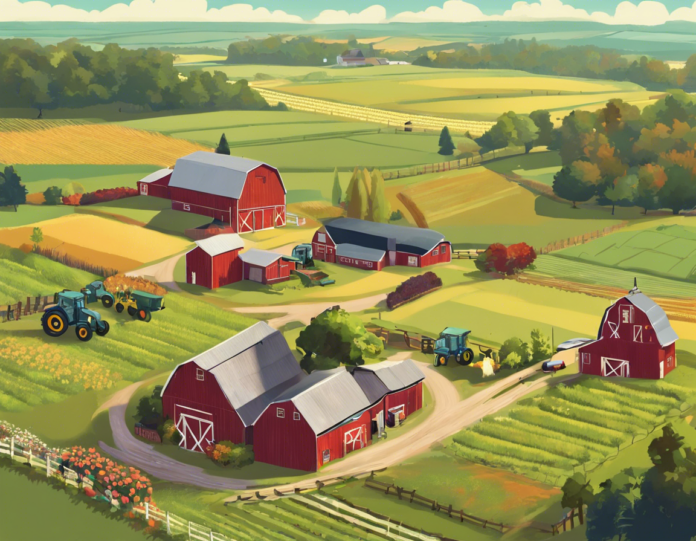Farming is often perceived as a simple job of planting and harvesting crops, but the reality is much more complex and demanding. A day in the life of a farmer is filled with numerous tasks that require hard work, dedication, and expertise. To provide an in-depth understanding of what it truly means to work on a farm, let’s explore the activities, challenges, and rewards that make up a day in the life of a farmer.
The Early Morning Routine
A farmer’s day typically begins before the crack of dawn. Waking up early is essential to make the most of natural daylight hours, especially during planting and harvest seasons. The day usually starts with a hearty breakfast to provide the necessary energy for the demanding tasks ahead. Farmers often rely on a robust breakfast to fuel their bodies for the physical labor that lies ahead.
Fieldwork and Crop Management
After breakfast, farmers head out to the fields to assess the crops and prioritize tasks for the day. This may include checking irrigation systems, inspecting plants for signs of pests or diseases, and deciding whether any fields need fertilization or pesticide application. Throughout the day, farmers may need to operate tractors, plows, or other machinery to prepare the soil, plant seeds, or harvest crops. Each crop has its own specific requirements, so farmers need to have a deep understanding of plant biology and soil science to ensure optimal growth and yields.
Livestock Care and Management
In addition to crop management, many farmers also raise livestock. Caring for animals is another crucial aspect of a farmer’s day. This involves feeding and watering animals, cleaning out stalls or pens, administering medication or vaccinations, and ensuring that the animals are healthy and well-cared for. Livestock farming requires compassion, patience, and a keen eye for animal behavior to detect any signs of illness or distress.
Equipment Maintenance and Repair
Farmers rely heavily on machinery and equipment to carry out day-to-day tasks. Tractors, plows, combines, and other farm equipment need regular maintenance to ensure they operate efficiently and safely. Farmers may spend part of their day servicing and repairing equipment, changing oil, replacing parts, or performing routine maintenance tasks. Being mechanically inclined is a valuable skill for farmers, as it can save both time and money by preventing breakdowns and costly repairs.
Market Research and Sales
Once the fieldwork is done, farmers often need to shift their focus to marketing and sales. This may involve researching market prices, negotiating with buyers, or arranging for the transport of crops to market. Building relationships with buyers, wholesalers, and retailers is crucial for farmers to secure fair prices for their products. In today’s digital age, many farmers also use online platforms and social media to promote their products and connect with customers directly.
Challenges Faced by Farmers
While farming can be a rewarding profession, it also comes with its fair share of challenges. Weather uncertainty is a significant concern for farmers, as droughts, floods, frosts, or storms can devastate crops and jeopardize livelihoods. Pest infestations and diseases can also wreak havoc on crops or livestock, requiring quick intervention to prevent widespread damage. Market volatility and fluctuating prices pose another challenge for farmers, who must adapt to changing market conditions and consumer preferences to stay competitive.
Rewards of Farming
Despite the challenges, farming offers a unique set of rewards that keep farmers dedicated to their work. The satisfaction of growing food to feed families and communities is a powerful motivator for many farmers. Witnessing the fruits of their labor as crops grow and mature is a gratifying experience that reinforces the importance of their work. Connecting with nature, working outdoors, and living a simple lifestyle close to the land are other rewards that attract people to farming as a way of life.
The Future of Farming
As technology advances and sustainable practices become increasingly important, the future of farming is evolving. Precision agriculture techniques, such as using drones, GPS technology, and data analytics, are revolutionizing how farmers manage their fields more efficiently. Embracing organic farming methods, reducing chemical inputs, and adopting conservation practices are also trends shaping the future of agriculture. Farmers are continuously adapting to meet the demands of a growing population while protecting the environment for future generations.
Frequently Asked Questions (FAQs)
1. What skills are essential for a career in farming?
To succeed as a farmer, individuals need to have a combination of practical skills, such as operating machinery and caring for animals, as well as knowledge in areas like agronomy, business management, and marketing.
2. How do farmers stay informed about the latest agricultural trends and technologies?
Farmers often attend workshops, conferences, and training sessions organized by agricultural agencies, universities, and industry associations. They also rely on agricultural publications, online resources, and networking with other farmers to stay up-to-date.
3. What are some common misconceptions about farming?
One common misconception is that farming is a simple, leisurely lifestyle. In reality, farming is physically demanding, mentally challenging, and requires a deep understanding of science, technology, and business.
4. How do farmers manage their finances, especially during volatile market conditions?
Farmers often work with financial advisors, agronomists, and market analysts to develop risk management strategies and financial plans. Diversifying crops, accessing government support programs, and investing in crop insurance are some ways farmers mitigate financial risks.
5. Is farming a sustainable career choice for the future?
Yes, farming is a sustainable career choice that plays a critical role in feeding the growing global population. With advancements in technology and a shift towards sustainable practices, farming offers numerous opportunities for innovation and growth.
In conclusion, a day in the life of a farmer is far from ordinary. It involves a diverse range of tasks, from fieldwork and livestock care to equipment maintenance and market sales. While facing challenges like weather uncertainty and market volatility, farmers are driven by the rewards of growing food, connecting with nature, and living a fulfilling lifestyle close to the land. As farming continues to evolve with technology and sustainable practices, the future of agriculture holds promise for those dedicated to feeding the world and stewarding the land for generations to come.

